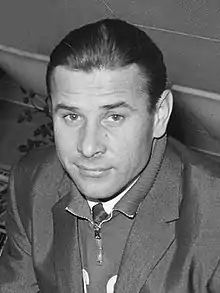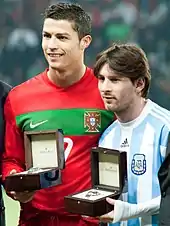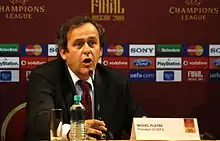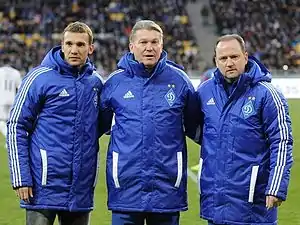Ballon d'Or
The Ballon d'Or (French pronunciation: [balɔ̃ dɔʁ] (![]() listen); lit. 'Golden Ball') is an annual football award presented by French news magazine France Football since 1956. Between 2010 and 2015, in an agreement with FIFA, the award was temporarily merged with the FIFA World Player of the Year (founded in 1991) and known as the FIFA Ballon d'Or. That partnership ended in 2016, and the award reverted to the Ballon d'Or, while FIFA also reverted to its own separate annual award The Best FIFA Men's Player. The recipients of the joint FIFA Ballon d'Or are considered as winners by both award organisations.
listen); lit. 'Golden Ball') is an annual football award presented by French news magazine France Football since 1956. Between 2010 and 2015, in an agreement with FIFA, the award was temporarily merged with the FIFA World Player of the Year (founded in 1991) and known as the FIFA Ballon d'Or. That partnership ended in 2016, and the award reverted to the Ballon d'Or, while FIFA also reverted to its own separate annual award The Best FIFA Men's Player. The recipients of the joint FIFA Ballon d'Or are considered as winners by both award organisations.
| Ballon d'Or | |
|---|---|
.jpg.webp) Ballon d'Or trophy | |
| Date | 1956 |
| Country | France |
| Presented by | France Football |
| First awarded | 1956 |
| Current holder | (1st award) |
| Most awards | (7 awards) |
| Most nominations | (18 nominations)[1] |
| Website | francefootball.fr |
Conceived by sports writers Gabriel Hanot and Jacques Ferran, the Ballon d'Or award honours the male player deemed to have performed the best over the previous year, based on voting by football journalists, from 1956 to 2006.[2] Originally, it was awarded only to players from Europe and widely known as the European Footballer of the Year award. In 1995, the Ballon d'Or was expanded to include all players from any origin that have been active at European clubs.[3][4]
After 2007, coaches and captains of national teams were also given the right to vote.[2] The award became a global prize in 2007 with all professional footballers from around the world being eligible.[5] In 2022, France Football modified the rules for the Ballon d'Or. They changed the timing so that awards were given not for achievements during a calendar year, but for a football season.[6] It was also decided that only those countries in the top 100 of the FIFA World Ranking would be allowed to vote.[7]
History
Stanley Matthews of England was the inaugural winner of the Ballon d'Or.[8] Prior to 2007, the award was generally known as the continental European Footballer of the Year award in English language and much international media. Even after 2007, it was usually identified with and referred to by that name because of its origin as a European award, until it was merged with FIFA's World Player award cementing its new worldwide claim.[9][10][11][12] Liberia's George Weah, the only African recipient, became the first non-European to win the award in 1995, the year that rules of eligibility were changed for the first time.[4] Ronaldo of Brazil became the first South American winner two years later.[4] The second rule change in 2007 to include players from all continents did not bring up new winners, as all recipients since then have still exclusively been active in Europe during their win.
Lionel Messi has won the award a record seven times, followed by Cristiano Ronaldo with five. Three players have won the award three times each: Johan Cruyff, Michel Platini, and Marco van Basten. With seven awards each, Dutch, German, Argentine, Portuguese and French players have won the most Ballons d'Or. Players from Germany (1972, 1981) and the Netherlands (1988) were the only to take all three top spots in one year, with German (1972) and especially Italian clubs (1988–1990) achieving the same feat, including two years solely made up of AC Milan players (1988, 1989), a unique record until Spanish clubs experienced an unforeseen dominance (2009–2012, 2015, 2016) and Barcelona (2010) became the second club with three top players. Two Spanish clubs, Barcelona and Real Madrid, also lead the ranking for employing the most winners, with twelve wins.[13]
Between 2010 and 2015 inclusive, the award was merged with a similar one, the FIFA World Player of the Year award, to create the FIFA Ballon d'Or, which was awarded to the world's best male player before FIFA and France Football decided not to continue the merging agreement.[14] After 2011, UEFA created the UEFA Best Player in Europe Award to maintain the tradition of the original Ballon d'Or of specifically honouring a football player from Europe.[15]
In 2020, the Group L'Équipe, to which France Football belongs, decided that no award would be given for the year due to the COVID-19 pandemic cutting short the seasons of football clubs worldwide.[16]
The award shows a bias in favor of attacking players, which has increased in recent years, espeially after 2007.[2] Over time, the award has gone to a more exclusive set of leagues and clubs.[2] Prior to 1995, 10 leagues supplied Ballon d'Or winners, whereas only England, France, Germany, Italy, and Spain have supplied winners since 1995.[2] Spain's La Liga has the most Ballon d'Or winners.[2] Barcelona and Real Madrid have supplied the most Ballon d'Or winners since 1995.[2]
In 2022, France Football modified the rules for the Ballon d'Or. They changed the timing so that awards were given not for achievements during a calendar year, but for a football season.[17] It was also decided that only those countries in the top 100 of the FIFA World Ranking would be allowed to vote. The plebiscite had previously been open to all countries since 2007. This brought the Ballon d'Or into line with the UEFA Men's Player of the Year Award which was slightly less dominated by exclusive leagues and especially Cristiano Ronaldo and Lionel Messi in recent years.[18]
Eight players (Bobby Charlton, Franz Beckenbauer, Gerd Müller, Paolo Rossi, Zinedine Zidane, Rivaldo, Ronaldinho, and Kaká) have won the FIFA World Cup, the European Cup/UEFA Champions League, and the Ballon d'Or during their careers.[19]
Winners
| |
This indicates the Ballon d'Or winning player also won the FIFA World Player of the Year or The Best FIFA Men's Player award in the same year (available in 1991–2009 and from 2016) |
|---|

.jpg.webp)

Wins by player



Note: One-time winners are only included if they have also finished second or third in another year.
| Player | Winner | Second place | Third place |
|---|---|---|---|
| 7 (2009, 2010, 2011, 2012, 2015, 2019, 2021) | 5 (2008, 2013, 2014, 2016, 2017) | 1 (2007) | |
| 5 (2008, 2013, 2014, 2016, 2017) | 6 (2007, 2009, 2011, 2012, 2015, 2018) | 1 (2019) | |
| 3 (1983, 1984, 1985) | — | 2 (1977, 1980) | |
| 3 (1971, 1973, 1974) | — | 1 (1975) | |
| 3 (1988, 1989, 1992) | — | — | |
| 2 (1972, 1976) | 2 (1974, 1975) | 1 (1966) | |
| 2 (1997, 2002) | 1 (1996) | 1 (1998) | |
| 2 (1957, 1959) | 1 (1956) | — | |
| 2 (1978, 1979) | 1 (1977) | — | |
| 2 (1980, 1981) | 1 (1979) | — | |
| 1 (1960) | 2 (1961, 1964) | 1 (1965) | |
| 1 (1965) | 2 (1962, 1966) | — | |
| 1 (1966) | 2 (1967, 1968) | — | |
| 1 (1958) | 1 (1959) | 2 (1956, 1957) | |
| 1 (1970) | 1 (1972) | 2 (1969, 1973) | |
| 1 (1998) | 1 (2000) | 1 (1997) | |
| 1 (1969) | 1 (1963) | — | |
| 1 (1987) | 1 (1988) | — | |
| 1 (1990) | 1 (1991) | — | |
| 1 (1993) | 1 (1994) | — | |
| 1 (1994) | 1 (1992) | — | |
| 1 (2004) | — | 2 (1999, 2000) | |
| 1 (1968) | — | 1 (1971) | |
| 1 (1977) | — | 1 (1983) | |
| 1 (2005) | — | 1 (2004) |
Wins by country

.jpg.webp)
| Country | Players | Wins |
|---|---|---|
| 5 | 7 | |
| 5 | 7 | |
| 3 | 7 | |
| 3 | 7 | |
| 1 | 7 | |
| 5 | 5 | |
| 4 | 5 | |
| 4 | 5 | |
| 3 | 3 | |
| 2 | 3 | |
| 1 | 1 | |
| 1 | 1 | |
| 1 | 1 | |
| 1 | 1 | |
| 1 | 1 | |
| 1 | 1 | |
| 1 | 1 | |
| 1 | 1 | |
| 1 | 1 | |
| 1 | 1 |
Wins by club
| Club | Players | Wins |
|---|---|---|
| 8 | 12 | |
| 6 | 12 | |
| 6 | 8 | |
| 6 | 8 | |
| 3 | 5 | |
| 4 | 4 | |
| 2 | 2 | |
| 2 | 2 | |
| 1 | 2 | |
| 1 | 1 | |
| 1 | 1 | |
| 1 | 1 | |
| 1 | 1 | |
| 1 | 1 | |
| 1 | 1 | |
| 1 | 1 | |
| 1 | 1 | |
| 1 | 1 | |
| 1 | 1 | |
| 1 | 1 |
Additional awards
An honorary award, under the name Super Ballon d'Or, was awarded to Alfredo Di Stéfano in 1989, after he surpassed Johan Cruyff and Michel Platini in France Football's voting.[22]
A decade later, France Football elected Pelé the Football Player of the Century after consulting their former Ballon d'Or recipients. Among the 34 previous winners, 30 cast their votes, while Stanley Matthews, Omar Sívori and George Best abstained, and Lev Yashin had died. Each voter was allotted five votes worth up to five points; however, Di Stéfano only chose a first place, Platini a first and second place, and George Weah two players for fifth place. Pelé was named the greatest by 17 voters, receiving almost double the number of points earned by the runner-up, Diego Maradona.[23]
| Player | Pts | 1st | 2nd | 3rd | 4th | 5th |
|---|---|---|---|---|---|---|
| 122 | 17 | 5 | 4 | 2 | 1 | |
| 65 | 3 | 6 | 5 | 5 | 1 | |
| 62 | 1 | 4 | 7 | 9 | 2 | |
| 44 | 4 | 3 | 3 | 1 | 1 | |
| 40 | 1 | 5 | 1 | 3 | 6 |
To coincide with the 60th anniversary of the Ballon d'Or in 2016, France Football published a reevaluation of the awards presented before 1995, when only European players were eligible to win the award. 12 out of the 39 Ballons d'Or presented during this time period would have been awarded to South American players; in addition to Pelé and Diego Maradona, Garrincha, Mario Kempes, and Romário were retrospectively recognized as worthy winners. The original recipients, however, remain unchanged.[24]
Maradona and Pelé also received honorary Ballons d'Ors for their services to football in 1995 and 2013, respectively.[25][26]
| Year | Original winner | Alternative |
|---|---|---|
| 1958 | ||
| 1959 | ||
| 1960 | ||
| 1961 | ||
| 1962 | ||
| 1963 | ||
| 1964 | ||
| 1970 | ||
| 1978 | ||
| 1986 | ||
| 1990 | ||
| 1994 |
In 1978, France Football published an article about that year's South American Footballer of the Year award in which they hypothesised a match between a South American All-Star Team and a European All-Star team, featuring the players who had performed the best in the award rankings.[27]
| Goalkeeper | Defenders | Midfielders | Forwards |
|---|---|---|---|
|
|
|
Since 2021, France Football has given the "Goalscorer of the Year" award, which was won in its first edition by Robert Lewandowski in recognition of the record-breaking 41 league goals he scored that year.[28] The "Best Club of the Year" award is also given from the same year onward, with Chelsea having been the inaugural winner. Since 2022, an additional award, the "Socrates Trophy", has been given, with Sadio Mané becoming the first recipient. The "Goalscorer of the Year" award was renamed into the "Gerd Müller Trophy" in honour of Gerd Müller the same year.
See also
- The Best FIFA Football Awards
- FIFPro World11
- Ballon d'Or Féminin
- Gerd Müller Trophy
- Kopa Trophy
- Yashin Trophy
- Socrates Award
Notes
- Kopa was signed by Real Madrid from Reims midway through 1956.
- Born in Argentina, Di Stéfano acquired Spanish citizenship in 1956 and went on to play for the Spanish national team.
- Kopa was signed by Reims from Real Madrid midway through 1959.
- Born in Argentina, Sívori acquired Italian citizenship in 1961 and went on to play for the Italian national team.
- Luis Suárez was signed by Internazionale from Barcelona midway through 1961.
- Cruyff was signed by Barcelona from Ajax midway through 1973.
- Keegan was signed by Hamburger SV from Liverpool midway through 1977.
- Krankl was signed by Barcelona from Rapid Wien midway through 1978.
- Schuster was signed by Barcelona from 1. FC Köln midway through 1980.
- Boniek was signed by Juventus from Widzew Łódź midway through 1982.
- Simonsen was signed by Vejle BK from Charlton Athletic midway through 1983.
- Elkjær was signed by Hellas Verona from Lokeren midway through 1984.
- Lineker was signed by Barcelona from Everton midway through 1986.
- Gullit was signed by Milan from PSV Eindhoven midway through 1987.
- Futre was signed by Atlético Madrid from Porto midway through 1987.
- Rijkaard was signed by Milan from Zaragoza midway through 1988.
- Bergkamp was signed by Internazionale from Ajax midway through 1993.
- Weah was signed by Milan from Paris Saint-Germain midway through 1995.
- Klinsmann was signed by Bayern Munich from Tottenham Hotspur midway through 1995.
- Ronaldo was signed by Barcelona from PSV Eindhoven midway through 1996.
- Shearer was signed by Newcastle United from Blackburn Rovers midway through 1996.
- Ronaldo was signed by Internazionale from Barcelona midway through 1997.
- Shevchenko was signed by Milan from Dynamo Kyiv midway through 1999.
- Figo was signed by Real Madrid from Barcelona midway through 2000.
- Ronaldo was signed by Real Madrid from Internazionale midway through 2002.
- Deco was signed by Barcelona from Porto midway through 2004.
- Cannavaro was signed by Real Madrid from Juventus midway through 2006.
- Cristiano Ronaldo was signed by Real Madrid from Manchester United midway through 2009.
- Neymar was signed by Paris Saint-Germain from Barcelona midway through 2017.
- Cristiano Ronaldo was signed by Juventus from Real Madrid midway through 2018.
- Messi was signed by Paris Saint-Germain from Barcelona midway through 2021.
- Mané was signed by Bayern Munich from Liverpool midway through 2022.
- Messi won four FIFA Ballons d'Or (2010, 2011, 2012, 2015) and twice finished in second place (2013, 2014).[20][21]
- Cristiano Ronaldo won two FIFA Ballons d'Or (2013, 2014) and thrice finished in second place (2011, 2012, 2015).[20][21]
References
- "Ballon d'Or: Players who have received the most nominations". 90min. 15 November 2021. Archived from the original on 29 November 2021. Retrieved 29 November 2021.
- Straeten, Karine van der; Laslier, Jean-François; Daoust, Jean-François; Blais, André; Arrondel, Luc; Anderson, Christopher J. (2020). "Messi, Ronaldo, and the Politics of Celebrity Elections: Voting for the Best Soccer Player in the World". Perspectives on Politics. 18: 91–110. doi:10.1017/S1537592719002391. ISSN 1537-5927.
- "Matthews wins first Golden Ball". BBC Sport. 1 December 2008. Archived from the original on 4 December 2008. Retrieved 4 December 2008.
- "The 1990s Ballon d'Or winners". BBC Sport. 1 December 2008. Archived from the original on 4 December 2008. Retrieved 4 December 2008.
- "Kaka wins 2007 award". BBC Sport. 1 December 2008. Archived from the original on 4 December 2008. Retrieved 4 December 2008.
- "Ballon d'Or : Quatre changements pour l'histoire".
- "Ballon d'Or : Quatre changements pour l'histoire".
- "Ronaldo joins legendary list". BBC Sport. 1 December 2008. Archived from the original on 4 December 2008. Retrieved 4 December 2008.
- "Kaka named world's best player". The Guardian. 17 December 2007. Archived from the original on 18 October 2017. Retrieved 18 March 2020.
- "Kaka named European Footballer of the Year". World Soccer. 2 December 2007. Archived from the original on 18 March 2020. Retrieved 18 March 2020.
- "Manchester United's Cristiano Ronaldo wants 'to get better' after winning European award". The Telegraph. 2 December 2018. Archived from the original on 18 March 2020. Retrieved 18 March 2020.
- "FIFA World Player Gala 2008". FIFA.com. 12 January 2009. Archived from the original on 26 July 2020. Retrieved 18 March 2020.
- "Rankings by Wins". Rec.Sport.Soccer Statistics Foundation. 9 October 2008. Archived from the original on 19 May 2019. Retrieved 4 December 2008.
- "The FIFA Ballon d'Or is born". FIFA.com. Fédération Internationale de Football Association. 5 July 2010. Archived from the original on 22 December 2012. Retrieved 4 December 2012.
- "How the award came about". UEFA.com. Union of European Football Associations. 9 August 2011. Archived from the original on 21 June 2012. Retrieved 6 November 2011.
- "THE BALLON D'OR® WILL NOT BE AWARDED IN 2020". L'Equipe. 20 July 2020. Archived from the original on 20 July 2020. Retrieved 20 July 2020.
- "Ballon d'Or : Quatre changements pour l'histoire".
- "Ballon d'Or : Quatre changements pour l'histoire".
- "Kaka: Former Brazil, AC Milan and Real Madrid midfielder announces retirement". BBC. 17 December 2017. Archived from the original on 18 June 2018. Retrieved 23 March 2018.
- "La liste complête des lauréats du Ballon d'or, de 1956 à nos jours". France Football. Archived from the original on 6 January 2016. Retrieved 14 January 2016.
- "FIFA Awards – World Player of the Year". Rec.Sport.Soccer Statistics Foundation. 12 February 2015. Archived from the original on 23 October 2018. Retrieved 14 January 2016.
- "On this day, Di Stéfano won the Super Ballon d'Or". RealMadrid.com. 24 December 2015. Archived from the original on 25 December 2015. Retrieved 13 January 2016.
- Stokkermans, Karel (23 December 2015). "France Football's Football Player of the Century". Rec.Sport.Soccer Statistics Foundation. Archived from the original on 30 January 2010. Retrieved 13 January 2016.
- Marchand, Thierry (December 2015). "On a refait le palmarès". France Football. Archived from the original on 1 February 2016. Retrieved 13 January 2016.
- "Combien de Ballon(s) d'Or France Football aurait pu remporter Diego Maradona ?". France Football (in French). 29 October 2020. Archived from the original on 14 November 2020. Retrieved 14 November 2020.
- "Pele receives FIFA Ballon d'Or Prix d'Honneur". FIFA.com. 13 January 2014. Archived from the original on 14 January 2014. Retrieved 14 January 2016.
- "Best soccer player in America ("El Mundo" of Venezuela)". BigSoccer Forum. Archived from the original on 4 October 2022. Retrieved 12 March 2022.
- "Ballon d'Or 2021 - Bayern Munich striker Robert Lewandowski wins Goalscorer of the Year award". Eurosport.com. Eurosport. 29 November 2021. Archived from the original on 2 December 2021. Retrieved 17 May 2022.
External links
- "European Footballer of the Year ("Ballon d'Or")". Rec.Sport.Soccer Statistics Foundation. 9 October 2008. Retrieved 5 December 2008.
- "La liste complête des lauréats du Ballon d'or, de 1956 à nos jours". France Football. Retrieved 24 March 2015.